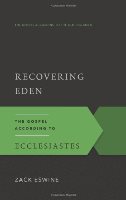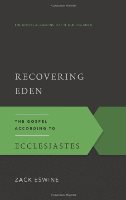Ecclesiastes may not be the most familiar book in the Bible, and it is doubtful you have heard many sermons from it. But it’s unique approach does spur a rising interest in our day, and for good reason – it addresses us as we are, in the “real world” of our daily life.
In a series of captivating chapters Zack Eswine (lead pastor at Riverside Church in Webster Groves, Missouri) takes us through this fascinating book, the latest in P&R’s Gospel According to the Old Testament series, and he is here to talk about his book – and about Ecclesiastes – with us today.
Books At a Glance (Fred Zaspel):
Let’s begin with the title – Recovering Eden. What are you trying to convey? Just what is the theme of Ecclesiastes?
Eswine:
As the preacher gives voice to the empty pursuits, injustices, and complaints of our earthly lives, he cycles back to repeat a conclusive theme over and over again. “There is nothing better” he repeats, than to enjoy the lot in this life that you’ve been given. The work you’ve been given, the food and drink that you have, the people with whom you share these good things, the wife you love, these are the “gain,” a gift from God for your joy.
It is like the preacher in Ecclesiastes has been away from home for a long time. He comes back and everything has changed and this for the worst. His fond memories of the goodness that once was are shattered by the painful realities of what now is. This disorientation rouses his lament. But he keeps coming back toward the dream of what once was. He asserts that as we take up and cultivate these ordinary gifts, we offer a counter way of life and by this, we take our stand now against the tide of emptiness and violence. No matter what happens during the seasons of this life, God’s good gifts of a place to be, a thing to do in that place, and a people to share it with, remain.
To me, this sounds like a lament for the Eden that was lost, and an assertion that what God gave us then, remains true for us today. Even though everything is meaningless and broken, we still can taste the goodness of His gifts to us. We can derive the joy He intends with food, family, work, and place. We retain these vocations as a feisty witness to something good that once was and that will one day find its restoration again.
 Books At a Glance:
Books At a Glance:
Ecclesiastes is a puzzling book to many – some of its statements sound less like an inspired author than a skeptic or an agnostic. How do you explain this?
Eswine:
That is a good question. Imagine the shock if your pastor stood in the pulpit this coming Sunday, opened his Bible and shouted, “Everything in life that you care about is nothing! It’s all meaningless! In fact,” he continues, “I hate life. I hate it because of the grief we all experience in it. I’m bone tired of it! It seems like God has just given us all busy work. Seems like he just wants to frustrate us and he won’t even tell us plainly what we are supposed to make of it all. I tell you this morning that it would be better if none of us had been born than to have to go through this.”
At this point, some of us as Christians would be very concerned about our pastor’s state of mind or salvation. We would have very little patience to sit through this kind of human experience and might seek immediately to squelch it or to get immediately to the offer of the good news in Jesus. But the fact that God has inspired and given us such a preacher with such language, with no haste to get to the good news, is intentional and it instructs us about God. God has provided with this book a needed gift of grace for our neighbors who are unfamiliar with the Bible and disinterested or suspicious of Christian life.
What I mean is that a Christian who listens to that opening by the pastor might react with concern. But many neighbors who do not follow Jesus would respond with pleasant surprise. Their inmost feelings are given a hearing on the lips of the preacher. It is as if the preacher has read their hearts. The spokesperson for God seems to know their innermost and unvarnished sentiments. What’s more as the preacher shares his heart they see themselves in him. Never has a “god-talker” sounded so true, so honest, so knowledgeable, and so relevant.
Ecclesiastes provides a needed primer for listening and talking humanly with our neighbors. These neighbors may have very little familiarity with the Bible but what they are familiar with is suspicion and caution regarding “church” and “religion.” They’ve been hurt by “god-talkers” or they know people who have. Or the “god-talk” they hear seems trite and irrelevant in comparison to the raw and real circumstances of their lives and in our world. The preacher in Ecclesiastes speaks to us, not as a churchy evangelist but as a human being who looks at the world, not as it is supposed to be, but as it is. His fear of God does not lead him to pretend away his questions or his pains and frustrations. His way of relating to the world is anything but trite.
This book enables us to learn from God how to have the questions, pains, pursuits and longings of the human condition upon our lips, without editing them, but as they actually are, so that human beings hear a spokesman for God with this kind of knowledge and empathy. Ecclesiastes is God’s primer for this kind of life and evangelism.
Books At a Glance:
You state that the author of Ecclesiastes – “the preacher” – “introduces but does not answer everything.” What do you mean by this? What is distinctive about his approach?
Eswine:
Only God can know everything and the preacher lives and speaks as if this is true. He does not pretend to answer things that are not answerable by human beings. In fact, he states that our attempt to do so reveals our folly – as if we are unlimited and can know what God knows. People, even in church, who talk like they know mysteries and futures, are put into a negative light by the preacher.
So, his approach is inductive. He does not answer what can be known until the end of the book. This means that we must wade through and experience the angst, questions, problems, and empty pursuits that are normative in our world, before we find anchor and steady our ground. By taking this approach, he requires us to resist quick fixes and sloganeering. Rather, we are apprenticed into a resistance toward denial. We can neither minimize trouble nor can we me exaggerate how redemption functions under the sun. Rather, we enter life as it is and look from there to God as he is. We surrender to what we can know and to what we can’t and live as if He is God and we are not. This approach is not distinctive in terms of the Bible and the wisdom literature, but it is very different for many of us who are not accustomed to this kind of preaching and this kind of community assumption. Many of us believe that we express the absence of faith if we question, don’t understand what God is doing or say that we do not know something. We also believe that if we sin its over and no later chapter of forgiveness or wisdom gained could take place in our lives with God. The kind of walk with God that Ecclesiastes envisions differs dramatically from these kinds of assumptions.
Books At a Glance:
How is the preacher’s aim an apologetic one?
Eswine:
His topics of conversation are earthly – time, music, money, sex, art, work, love, food, injustice, fools who go to church and cause harm.
His method is human. The preacher is a King, who wears the mantel of the Son of David and who possesses wisdom that surpasses any in his generation. Yet, he speaks to us in first person testimony, to share his heart. His words almost read like an unedited personal journal. He does not use language that requires knowledge of Abraham, or Moses.
He starts with God as Creator and ruler of our physical reality rather than simply with God as redeemer of our souls.
He is hospitable toward negative emotions, misguided thoughts, and terrible mistake making. That is, he does not silence these as if they are not supposed to happen. He admits instead that such things already have happened. So, now what?
His language is full of poetry, questions, heartfelt emotion, and everyday speech, rather than tidy Western systematic language.
His approach is inductive, as we’ve said, which means that he will resist giving hasty answers or quick fixes and will instead give room for discomfort and disorientation as reasonable and possible before God.
In all of this, before the preacher says who God is, he gives room for his own heart and his hearers to wrestle with what God seems like and what this world and our inner lives can feel like.
By this means the preacher invites us into dialogue in a very personal and real way, to teach us that God can handle that, and that we were made for it with Him. The preacher’s message has a resonance with some of the Apostle Paul’s sermons in the book of Acts, when Paul speaks to those who do not know the Bible or the God of the Bible. Instead of starting with Abraham and quoting from the scriptures, Paul starts with God the creator and quotes from their own poets in order to start a conversation in Jesus’ direction.
 Books At a Glance:
Books At a Glance:
How does the Preacher characterize the human condition? And how is the human experience one of “vanity”?
Eswine:
We were created upright and noble but we’ve sought out many schemes. The result is that we now try to use God’s good gifts to us as if the gifts themselves are God. When we do that, we use our work or food or love or family in vain. Such things cannot provide the gain that we seek. Only God can do that.
Books At a Glance:
What is the significance of the recurring phrase, “under the sun”?
Eswine:
The focus of the preacher isn’t life as it will be in heaven but life as it actually is on this earth. The Eden that once existed under this sun that we see in the sky nearly everyday is now the fragmented place of violence and challenge within which we must do our lives. “Under the sun” means that we are not talking ideally or romantically or wishfully but plainly without artifice or blush regarding what takes place in the world.
Books At a Glance:
At the very end of the book (sermon!) the preacher states his “conclusion”: “The end of the matter; all has been heard. Fear God and keep his commandments, for this is the whole duty of man. For God will bring every deed into judgment, with every secret thing, whether good or evil.” What, exactly, is he getting at? And how did his sermon get him there?
Eswine:
This is a great question. Now that we’ve heard the various kinds of narratives that rise from beneath the sun, the preacher wants us to place them as they are, beneath a larger narrative that precedes and outlasts ours. Every violent and sinful thing that we see and experience will be judged by God, just as every beautiful and good thing will. God is alive and active. Nothing that has happened has escaped his notice. He will have the last word and that last word will be good and just. His judgment not only calls out what is wrong but it will also defend what is good and right. Not only will sinners be judged but the sinned against will be delivered. Therefore, under this sun, we set our hearts on that God and that larger storyline, submitting our lives to the noble gifts that remain under this sun in the way that they were meant to be used, and cultivating them until he comes.
Books At a Glance:
Your subtitle is The Gospel According to Ecclesiastes. How does this Old Testament book point us to Christ?
Eswine:
Wonderfully! Jesus is the One greater than Solomon. Jesus is not only our Savior but also our wisdom. Jesus often teaches the same things that Ecclesiastes teaches or asks the same kinds of questions that Ecclesiastes asks. But now they are taught and asked in Him and placed onto the sympathetic lips of the one who will live, die, rise, advocate and judge for us. Jesus, as the Son of David, the King, fulfills what Solomon or those who spoke in his name, could not.
A story is told in Ecclesiastes of a poor wise man who saved the city from grand warrior king who wanted to prove his grand might. After the poor wise man saved the city by his wisdom, no one remembered him. Since they were safe once again they went back to their established values which would have esteem for wisdom, especially if it came in the form of an impoverished one with no status or wealth or perceived power in their eyes. What a foreshadowing this story offers us. For Jesus is the poor wise man who saves the city but is remembered not and overlooked.
Books At a Glance:
Having preached through the book yourself, what advice can you give preachers who are considering – or beginning to – work their way through the book?
Eswine:
It can challenge us and our congregations to preach through Ecclesiastes. Mainly, because as American Christians we are by and large unaccustomed to the wisdom literature of the Bible. So, the first time one preaches through this book, it might serve the congregation well, to survey the themes rather than plow through verse by verse. The chapter titles in my book offer a guide to what these over arching themes are. Then, come back to the book more fully later on in the life of the congregation. Or, if you pursue chapter-by-chapter or verse-by-verse, you might need to start with the end. That is, go ahead and alert the hearer to chapter 12 and to what the point of the book is by spending time on this as an opening sermon for the series. Then frame each subsequent sermon with this reminder of the point. In other words, with a pastoral mindfulness of how different and uncomfortable this book can be, approach the sermon series in a more deductive fashion even though the book itself is inductive in nature. If you preach in a setting that is not predominately made up of Christian hearers, it is probable that you can simply walk through the angst chapter by chapter building to the main point at the end, because oftentimes such hearers have more patience with less tidiness. What they hear will likely refresh and compel them to want to learn more about the God who can talk like this.

